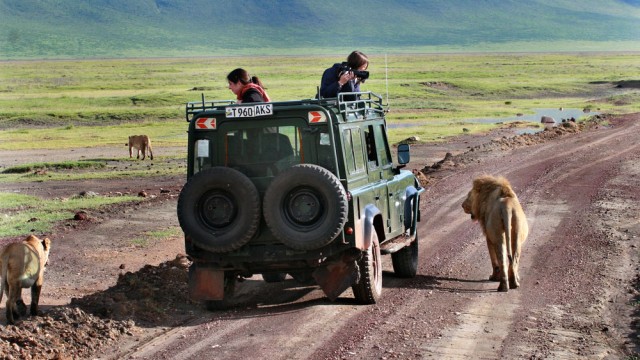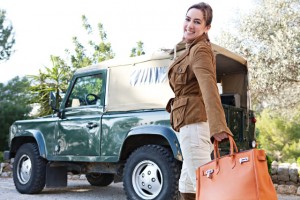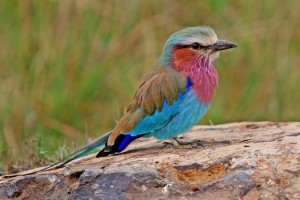You’ve seen the David Attenborough nature documentary, bought a pair of binoculars that cost more than an entry level car and you’ve had all your shots. Before you board the plane to Africa, read this first.
Leave the pith helmet at home
There is no need to look like an extra from Out of Africa when you’re on safari. I always get amused when I see first-time African travellers dressed from top to toe in khaki, some complete with correspondent jackets. And yes, I’ve seen someone wear a pith helmet as well (although I’m not sure if it was done ironically). Depending on the time of year you’re visiting, three pairs of chinos, linen or cargo pants, two pairs of shorts, a few shirts and T-shirts in light neutral colors and a wide-brimmed hat would be more than enough. Think basics that you would wear on an outdoor holiday at home. You don’t have to splurge out on fancy safari gear that will end up in the closet back home after your journey. Pack light and leave the leopard print coat at home at well, unless you’re okay with the local travellers sniggering behind your back.
It gets cold, really cold in Africa
Yes, we know the brochure says the average temperature is 90 degrees in the shade, but keep in mind that most game viewing activities get conducted on an open game viewing vehicle, just after dawn in the morning and just before dusk. Throw in a wind chill factor, and your teeth will be chattering in no time. In winter the temperature can fall below freezing, especially in desert areas. Most safari lodges do provide blankets and fleece-lined ponchos on their vehicles, but I will strongly recommend that you pack some warm clothes as well, even if you’re going to the equator. A warm but light fleece jacket, scarves and beanie hat will serve you well. Dress in layers on the safari vehicle, you can peel the clothes off as it gets warmer.
It’s not all about the Big Five
Everybody wants to see a lion, leopard and elephant on their safari and your game ranger will probably go out of his way to show you these majestic animals. However, if you’re only looking out for the big, famous animals, your safari will be a very shallow experience. A game ranger once gave me a fascinating lecture about dung beetles and how these little guys use the stars to navigate. Or just stopping and taking the time to study the vivid colors of a lilac breasted roller, one of Southern Africa’s most common but beautiful birds. If you are patient and look deeper, Mama Africa is always willing to reward you.
You might strike it lucky…or not
Going on safari is a bit of a gamble; it is not like going to the zoo and knowing that you are going to see a lion, elephant and rhino, all in one afternoon. Game viewing is dependent on so many things; the time of day, the time of year, seasons, and the weather. During a recent visit to the Central Kalahari Game reserve in Botswana we saw very little game, despite it being one of Africa’s best parks to view predators. On a former visit, it was quite different. Ebony maned lions reclined under every second acacia tree. Cheetahs pranced on the savannah. It’s the luck of the draw. And as most rangers tell you, the more you want to see an animal, the less are your chances of spotting it in the wild.
Try to engage with your guide
They don’t call game rangers Bush Google for nothing. Most of them have studied quite long to become game rangers, and they have an encyclopaedic knowledge of the bush. However, few of them get to share that knowledge because they are always rattling of the same old facts to tourists obsessed with the Big Five. Do a bit of research on the area that you are visiting, they will appreciate that you’ve gone to the trouble. Ask them about the less popular animals. Wildebeest, for example have fascinating sex lives, and brown hyaenas mark their territory with little anal beads. It’s also a good idea to inform the lodge about your interests like birds or botany before you arrive. This way they can pair you up with the most knowledgeable guide in your field of interest.
You may be faced with Africa’s hard realities
Travel brochures are filled with iconic images of herds of wildebeest on the great plains, lions reclining under umbrella thorns and elephants frolicking in mighty rivers. You may see all of the above, but there is a small chance that you’ll also be confronted with a less picturesque side of the continent. Africa is ravaged by poaching and some game parks like the Kruger National Park have become hot spots for this macabre wildlife trade. Tourists have reported seeing injured rhinos, barely alive dwell through the bush. During a recent visit I saw an elephant with a gangrenous trunk that was injured by a snare. You have to take the bad with the good. When confronted with this, your guide will usually alert the local authorities, who will then will decide on the fate of the animal.
You’ll probably gain weight
Most safari lodges include full board, but don’t expect dinner, lunch bed and breakfast. Some of the spreads at these lodges will put the cruise ship industry to shame. The morning usually starts with a light continental breakfast, or rusks and coffee. During the morning game drive you stop for more coffee, muffins and scones. Back at the lodge you are served a big brunch spread. The rest of the day is spent at leisure until about 15:00. Then it’s time for High Tea. Expect cake, canapés and all sorts of sweet and savoury snacks. During sundowners, you’ll be served more snacks and on your return have drink by the fire and more canapes, before indulging in a three-course meal. Then we aren’t even talking about all the fine Cape Red and G&T’s you’ll be quaffing in between. If your package includes “all local spirits, beers and wines.”, then you’re in for a treat.



